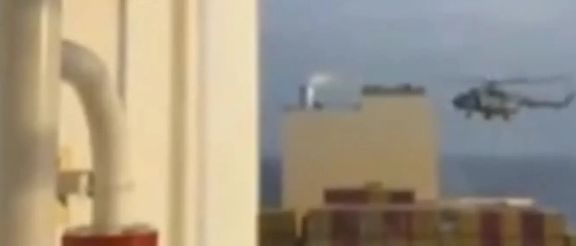Iran’s IRGC chief boasts of attacks on 'Israeli ships'

Hossein Salami, Commander-in-Chief of Iran’s Islamic Revolutionary Guard Corps (IRGC), claimed responsibility for a series of attacks on 12 ships in the past that he called “Israeli”.

Hossein Salami, Commander-in-Chief of Iran’s Islamic Revolutionary Guard Corps (IRGC), claimed responsibility for a series of attacks on 12 ships in the past that he called “Israeli”.
His statement, made during a visit by President Masoud Pezeshkian to the IRGC’s Khatam al-Anbia Construction Headquarters, came in the wake of weeks of tensions following the killing of Hamas's political chief, Ismail Haniyeh, in Tehran.
Salami justified the attacks by claiming they were in retaliation for strikes on 14 Iranian oil tankers in the Red Sea and the Mediterranean—accusations he placed on Israel, albeit with no evidence.
Since 2019, the IRGC has attacked or boarded numerous commercial vessels in the Persian Gulf region, often claiming that they were Israeli ships.
Salami’s remarks, laden with Tehran's usual conspiratorial tone, stated that Israel's attacks were designed to stymie Iran’s oil exports. However, what Salami left out is that when he refers to “Israeli ships,” these were commercial vessels, not military targets, perhaps partially owned by individuals of Israeli descent. This kind of rhetoric usually accompanies Tehran’s attempts to defend and justify its behavior on the international stage.
Israeli officials have so far remained silent on these claims. Salami’s statements follow a pattern of Iran seizing foreign vessels under dubious pretenses. This includes the seizure of oil tankers, such as the British-flagged Stena Impero in 2019 and, most recently, the Marshall Islands-flagged St. Nikolas in the Gulf of Oman.
Iran’s approach to maritime security seems to hinge on hostage diplomacy. The 2019 seizure of the Grace 1 by British authorities, on suspicion of breaching sanctions by transporting oil to Syria, was met with a retaliatory move by the IRGC, which seized the Stena Impero.
In January, Tehran seized the Marshall Islands-flagged oil tanker St. Nikolas and also expanded its maritime provocations, attacking the M/V Pacific Gold tanker, registered in Liberia with a drone in the Indian Ocean.

IRGC’s chief commander attempted to justify such actions by referencing sanctions, military threats, or even former US President Donald Trump, whom Salami described as being "no less of a threat than COVID-19."
Iranian officials appear to be concerned about Trump's possible return to the presidency, expecting a tougher policy by Washington than what has transpired during the Biden administration.
Vice Adm. Brad Cooper of the US 5th Fleet earlier made it clear that Iran’s actions “violate international law and pose a threat to maritime security and stability.” Yet, despite these warnings, Tehran seems determined to continue its behavior, using the high seas as yet another battlefield in its ongoing quest for regional dominance.